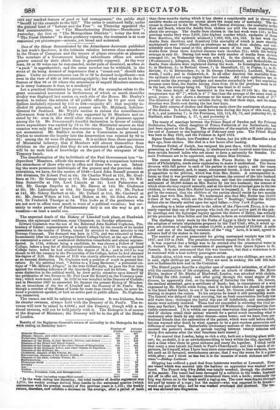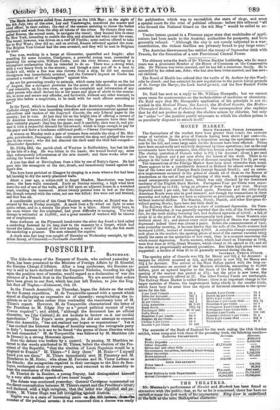The treaty of marriage between the Prince Royal of Sweden
and the Princess Gullehnina Maria' eldest daughter of Prince Frederick of the Netherlands, has just been signed at the Hague. The celebration of the nuptials will take place at the end of January or the beginning of February next year. The Prince Royer was born in May 1826, and the Princess in April 1824.
Signor Daniels Mani; late President at Venice, lost his wife at Marseilles a few days ago, from cholera. She died in a few hours after landing.
Professor FrObel, of Zurich, has resigned his post there, with the intention of proceeding as Professor to Hamburg, in obedience to a call received some time since from certain learned ladies who are about to form a university for females. Fe- male Professors are to be appointed, among others Miss Dittmar.
The recent decree divorcing Mr. and Mrs. Pierce Butler, by the competent court of Philadelphia, needs some explanation to make it understood. The decree divorces with full power to each of the parties to marry again ; and the reason given for this summary, and, to many, unexpected decree, is that no one appeared in opposition to the petition, which was from Mrs. Butler. A correspondent in- forms us that it was previously arranged between the counsel of the late husband and wife that there should be no opposition, and that the consideration was the- settlement of 30,000 dollars on Mrs. Butler by her late husband; the interest of which alone she may expend annually, and at her death the principal goes to the two children, to whom alone Mrs. Butler has power to bequeath it. It was also arran- ged by the counsel, that the children of the parties should reside for two months in each year with Mrs.. Butler. We understand also that Mrs. Butler has 20,000. dollars of her own, which are the fruits of her " Readings," besides the 60,000. dollars she BO liberally settled upon her aged fatlier.-New York Express.
According to a letter addressed to the editor of the Plymouth Times, it is cur- rently reported that one of the persona whotook the most active part at the pub- lic meetings and the Episcopal inquiry against the Sisters of Mercy, has actually jet his premises to Miss Sellon and the Sisters, to form an establishment at Eldad.
The challenge lately made by the Pasha of Egypt is likely to be accepted, on the adoption of certain stipulations proposed by the Turf Club ; who, it would ap- pear, are desirous of making the stakes 15,0001. a side instead of 10,0001. A noble- Lord and one of the leading members of the" ring" have, it is said, agreed to advance half of the stakes in the match.
The number of persons prosecuted for giving nnstamped receipts was 102 in 1847, and 119 in 1848. The penalties recovered ranged from Si. to 601.
It was reported that a bridge was to be erected over the ornamental water in. St. James's Park, for the tconvenience of passengers from Queen Square to St.. James's. It is now announced that this was incorrect, but that a waterman is to be stationed with a boat to ferry passengers across.
Rabbit-skins, which were selling some months ago at two shillings, are now, it is said, eight shillings per pound. They are used in making the soft felt hats now so fashionable here and on the Continent.
The Bristol papers describe a singular case of suspended animation, or of death with the continuation of life snniptoms, after an attack of cholera. Mr. Byron Blythe, nephew of Mr. Blythe of 131ackwall, London, was attacked with cholera, on.Friday the 12th instant; and after going through the usual stages of the disease, he apparently died, on the Morning of Saturday the 13th. Dr. Greene, the medical attendant, gave a certificate of death; but, in consequence of a wish expensed. by Mr. Blythe while living, that if he cholera he should be pierced in the heart before burial, to see if he was dead, Dr. Greene called again in the evening to inspect the corpse. To his surprise he found it still perceptibly warm. The funeral was delayed till next morning, but on fresh examination the body was still warm then: thereupon the burial Was put Off indefinitely, and resuscitative. means were actively renewed. ' These had not succeeded in restoring the vital ac- tions any further • but the warmth continued till Wednesday: decomposition then visibly commenced. [It is within our personal observation that patients who have died of cholera retain their animal warmth for a period much exceeding what is customary after death by any other disease-some hours; and we learn from pro- fessional friends that the extremities of the patient, which were cold before death, become warmed after death by what appears to be a post-mortem generation and diffusion of animal heat. Remarkable involuntary motions of the extremities also succeed the patient's death, at periods varying between twenty minutes and thirty-five minutes after the vital functions have ceased.] "I do marvel that London, being so rich a city, bath not a burying-place with- out; for, no doubt, it i/1 an unwholesome thing to bury within the city, specially at. such a time when there be great sickness and many die together. 1 think verily that many a man taketh his death in Paul's Churchyard : and this I speak of ex- perience, for I myself, when I have been there some mornings to hear sermons, have telt such an ill-favoured, unwholesome savour, that I was the worse for it a great while after; and I think no less but it is the occasion of much sickness and dis- tress."-Bishop Latimer.
Shipping has suffered a good deal from boisterous weather at Lowestoft. ROM one vessel which was assisted into the harbour an apprentice was washed over- board. The French brig Pere Joliet was totally wrecked, through the obstinacy of the master. The vessel had been damaged by a collision in the roads; boatmen put off to offer aid, but the master threatened them with a knife; eventually the- brig was driven on to the beach amid a raging sea. The crew were drawn throe& the surf by means of a rope; but the master-who was reported to be drunk- would not quit the ship; and he was washed overboard and drowned. The YCZ- RI was shivered into fragments. The Marie Antoinette sailed from Antwerp on the 12th May: on the night of the 4th July, two of the crew, Loy and Vandeweghe, murdered the master and i
chief officer, n their cabins; the rest of the seamen assisting to throw the bodies overboard and wash from the ship all tokens of the crime. By threats they coin- ed Kessen, the second mate, to navigate the vessel; they wanted him to steer terliNew York, intending to scuttle the ship and abandon her when near the coast. The vessel, however, was driven on a reef off Florida; some natives offered to take her to Key West; they did so; and on arrival, Kessen informed against the crew. The Belgian Vice-Consul had the men arrested, and they will be sent to Belgium for trial Two men, working in a barge at Gloucester, quarrelled and fought: after wrestling for some minutes, Goodgroom, a powerful young man, succeeded in throwing his antagonist, William Cooke, into the river Severn; showing by a triumphant exclamation that he intended to do so. There was a strong wind, with a very heavy fresh in the stream ; and though a man put off in a boat to Cooke's aid, while a line was also thrown from a ship,. he did not succeed. Goodgroom was immediately arrested, and the Coroner's Inquest on Cooke has returned a verdict of " Manslaughter " against him.
An act for preventing cruelty to animals, which came into operation on the 1st of August, has a stringent provision for the arrest of offenders. It authorizes "any constable, on his own view, or upon the complaint and information of any other person who shall declare his or her name and place of abode to the consta- ble, to seize and secure any ofthnder, and forthwith, without any other warrant, to convey him before a magistrate, to be dealt with for such offence according to law.
In'the Tyrol, which is deemed the Bceotia of the Austrian empire, the Roman Catholic clergy have been launching interdicts and excommunications against the subscribers and readers of the Inspruck Gazette, the only Liberal paper in the country; but in vain. At last they hit on the bright idea of offering a reward of 20 Austrian kreuzers (13d.) for every torn copy. The peasants have thus had their curiosity piqued: they bay the paper, read it carefully, then tear it, and pre- sent it with a respectful demand for the reward; which is large enough to pay for the paper and leave a handsome additional profit—Vienna Correspondence.
A woman on Monday stole a pair of trousers from outside the shop of Mr. Hol- gate, pawnbroker, Deansgatc; then coolly entered the shop and pledged the trou- sers to the owner; who did not discover the theft until the thief had escaped.— Ilanchester Spectator.
Mr. Philip Hill, the parish-clerk of Wootton in Bedfordshire, has lost his life by the bite of a dog. He was bitten in the bands- the wound healed up; some days subsequently inflammation of the arm ensued; and three weeks after re- ceiving the wound he died.
A man has died at Birmingham from a bite by one of Batty's tigers. He bad gone into the menagerie at the fair, drunk, and incautiously leaned against the tiger's den.
Two boys have perished at Glasgow by sleeping in a room where a fire had been left burning-to dry the newly-plastered walls.
'About a year ago, a cotton-mill in Angel Meadow, Manchester, was burnt down; the bare walls remained. Early on Sunday morning, a high wind blew down the end of one of the walla, and it fell upon an adjacent house in a wretched cote, crashing the tenement. About twenty persons were in bed at the time; tut, though covered with the ruins, not one was killed: five were cut and bruised, and that was all.
A considerable portion of the Great Western cotton-works at Bristol was de- stroyed by fire on Friday sennight. A spank from a fly-wheel set light to some -cotton refuse, and in a minute the place was in a blaze. About thirty boys, in the room where the fire originated, had great difficulty in escaping. The total damage is estimated at 15,0001., and a great number of workers will be thrown out of employment.
Some workmen on the Plymouth breakwater the other day found a bird called a sanderling fastened by its long claw to the masonry by a limpet, which had tuned the tables ; instead of the bird making a meal of the fish, the fish made the sanderling a prisoner. The men released the captive.
A shark nine feet long was caught off Hensley on Wednesday sennight, by Mr. Adam Storey, of Cresswell—Newcastle JoureaL

























 Previous page
Previous page